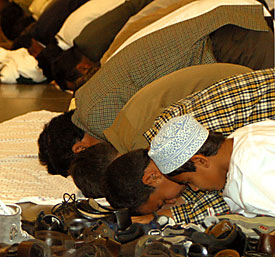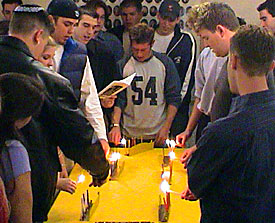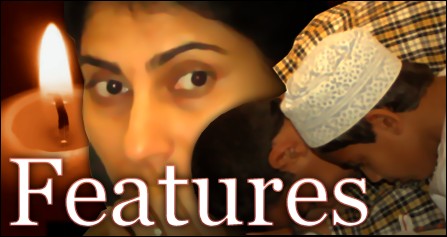 |
|
EMILY REID/Arizona Daily Wildcat
|
Men pray at an Id-al-Fitr, or the Feast of Fast-Breaking, service commemorating the end of Ramadan at the Tucson Convention Center last Friday. A breakfast feast was served afterward. Id-al-Fitr is celebrated for two days, and marks the end of a month of fasting and abstinence from smoking and sexual relations.
|
|
By Biz Bledsoe
Arizona Daily Wildcat
Tuesday December 10, 2002
Christmas is not the only religious occasion celebrated this time of year
In the midst of Christmas shopping, parties, gift wrapping and decorating, not to mention finals, it is easy to become swept away in the excess of the Christmas season ÷ even if you don't celebrate the holiday. So it's important to remember that for many students at the UA, this time of year brings other holy and happy occasions.
Ramadan and Hanukkah are just two of several religious and cultural events that many students observe during the holiday season. And although the Christmas season can overshadow other holidays in the public's (and the consumer's) eye, there are many students who celebrate these events in the midst of all the hustle and bustle.
One such student is Bassam Abdulghani, a systems engineering senior and president of the Muslim Student Association. For the past month, he and other Muslims have been fasting during the day in order to observe Ramadan, which began Nov. 6.
 |
|
Photo courtesy UA Hillel Foundation
|
Students celebrate the Jewish holiday of Hanukkah, last week with friends from the Hillel Foundation.
|
|
Ramadan is a time of contemplation and worship, and is one of the two major holidays for Muslims. The Fast of Ramadan occurs at a different time every year on the secular calendar, but always on the ninth month of the Islamic calendar. The cycle of the moon determines the starting and ending dates for the month.
"Ramadan, before Islam, was just like any other month of the year," Abdulghani said. "But it has a specific and special value for Muslims because it was the month in which the first verses of the Koran were revealed to Mohammed. Fasting during Ramadan was obligated upon Muslims in the second year of the immigration of the prophet."
During Ramadan, Muslims are encouraged to read the Koran and concentrate less on everyday life. During the day, eating and drinking are forbidden, and smoking and sexual relations are stopped for the entire month. At night, the fast is broken with a prayer and a small meal called the iftar. After iftar, Muslims usually go out and visit family and friends. During Ramadan, it is also common for Muslims to pray and study at a mosque for longer than usual, and another daily prayer is added to the typical five.
The MSA, along with the Islamic Center of Tucson, provided several activities for Muslim students during Ramadan, such as fast-breaking meals at night.
If you go ·
To gain a more in-depth understanding of Hanukkah, Ramadan and Christmas, as well as Kwanzaa and Las Posadas, attend a holiday celebration discussion at Pima Community College East Campus.
The free discussion will be held on Friday from 6:30 p.m. to 8:30 p.m. at 8181 E. Irvington Road. Call 206-7000 for more information.
|
Ramadan is not a celebration, but rather a time of worship, contemplation and restraint.
"Ramadan has many purposes," said Omar Shahin, the imam and director of the Islamic Center. "First, it gives you the opportunity to feel what the hungry people all over the world feel, because we are not eating or drinking during the day.
"Another thing that Ramadan does ÷ and this is the most important thing ÷ is we are doing what Allah commands us. It teaches us to have one standard in life, so we don't live a hypocritical life."
The serious and meaningful aspects of Ramadan are what make this less of a holiday and more of a religious observance.
 |
|
EMILY REID/Arizona Daily Wildcat
|
A woman looks around after finishing prayer at a service held at the Tucson Convention Center to celebrate the end of the Muslim holiday of Ramadan.
|
|
"It's not a holiday. It's a month in which people get more connected to God," Abdulghani said. "The holiday comes after the month of Ramadan. Muslims celebrate not that the month is over, but that they had the chance to observe the month."
Abdulghani is referring to Id-al-Fitr, or the Feast of Fast-Breaking, a holiday on the first day of the month of Shawwal. Id-al-Fitr is celebrated for three days. In Tucson, the holiday began the morning of Dec. 6 when many Muslims gathered at the Tucson Convention Center to pray and share breakfast and gifts.
All the efforts of MSA and the Islamic Center helped Muslim students observe Ramadan in a culture that doesn't make the strict regulations of the month easy to follow.
"Because of the cultural differences, it's hard for (Muslim) students (in the United States) to feel the difference between the month and the other days," said Abdulghani, who is originally from Yemen. "In our countries · you see everybody fasting, everybody doing more worshipping, the TV programs are different. All these things make the month different from the other months, unlike here."
Jewish students at the UA celebrate Hanukkah as a time of worship and contemplation that can be difficult to celebrate while at the university. Although Hanukkah is not one of the major Jewish holidays, like Yom Kippur and Rosh Hashanah, it is an important celebration that is meant to be spent with family and friends.
"(Hanukkah) has been a bit different since I've been at college. This year, I only got to spend two nights of it with my family," said Sarah Kader, a sophomore majoring in Spanish who is also the Hillel Foundation's Koach co-chair and president-elect. "Ideally, and in the past when I lived at home, it really means spending time with my family, lighting the hanukkah or the menorah, watching the candles burn and singing songs, and my mom will make latkes and jelly donuts."
Hanukkah is an ancient Jewish holiday that, like Ramadan, begins at a different time every year on the secular calendar. Hanukkah always begins at sunset on the 25th day of the Hebrew month Kislev. This year, Hanukkah began at sunset on Nov. 29 and ended on Dec. 7. The festival lasts for eight days and nights and commemorates events that happened over 2,000 years ago in what is now Israel.
Hanukkah represents the rededication of an ancient temple by a group of Jewish people, called the Macabees, after the temple was taken over by the Greeks and then reclaimed. As the tradition goes, after the temple was rededicated on the 25th day of Kislev, a light was lit with a little bit of oil that was only expected to last for one day. However, a miracle occurred that allowed the light to stay lit for eight days. Hanukkah means rededication.
"The main part of the Hanukkah celebration is every night lighting the candles of the menorah ÷ starting with one the first night and increasing each night until you get to eight," said Hal Ossman, assistant director of the Hillel Foundation. "People also get together, and there are traditional foods they eat during Hanukkah."
Some traditional foods include potato latkes and sfganiyout, or jelly donuts, and Hanukkah gelts, which are chocolate coins. People also play games and exchange gifts.
The campus' Hillel Foundation helps Jewish students feel more at home, especially during holidays like Hanukkah. Activities and gatherings were organized for each of the eight nights to bring together the campus Jewish community and provide a more celebratory Hanukkah experience. This year, Kader estimates that at least 400 students participated throughout the week of events.
"Because a lot of us can't be with our families on Hanukkah, it's a community that we can gather with and celebrate Hanukkah," Kader said. "We try to re-create something that you might find at your home, so that even though you're away from home you can experience Hanukkah in a positive way."


